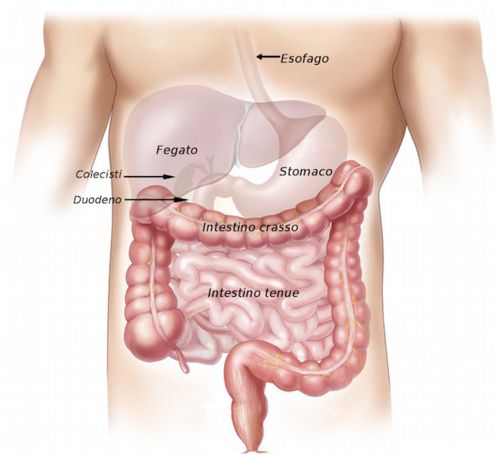Irritable bowel: symptoms, causes, all remedies
Irritable bowel syndrome is also called by many other names: spastic colonpathy, colitis, irritable bowel and many other definitions to indicate a disorder that is often accompanied by pain in the lower abdomen and changes in defecation . Let’s find out better how to cure it.
> Symptoms of the irritable bowel
> Causes
> Diagnosis
> Treatments against irritable bowel

Symptoms of the irritable bowel
Irritable bowel sufferers may experience diarrhea or constipation or both alternately. The disease is called functional, because it refers to a malfunction of the organ. Indicated by the acronym IBS (from English, Irritable Bowel Syndrome ), it is frequent in women aged 20 to 40 and is due to a combination of factors: eating habits, sedentary lifestyle, genetic predisposition, emotionality.
When the bowel is irritable, there are changes in intestinal motility combined with an altered perception of visceral pain. Along with abdominal pain and discomfort in defecation, changes in the shape and consistency of stool are common consequences.
Causes
The causes of irritable bowel are not yet certain. Several studies have shown that in patients suffering from this pathology, the intestine and colon have a greater sensitivity and can therefore have abnormal reactions in case of stress or when taking particular foods.
Another cause could lie in the malfunctioning of the immune system , which would not fight any infections in the right way.
Recent studies have also shown that there is a link between irritable bowel syndrome and serotonin : in fact, abnormal levels of this neurotransmitter result in problems with defecation and intestinal motility.
Finally, even a mild form of celiac disease could cause irritable bowel syndrome.
Diagnosis
There are no specific tests to diagnose irritable bowel syndrome. The identification of this pathology, therefore, starts from an analysis of the patient’s clinical history in its entirety, combined with an accurate description of the symptoms and a meticulous physical examination.
It is also possible to resort to some laboratory tests , such as blood tests, stool tests and, in some not rare cases, even a colonoscopy.
There is also the possibility of carrying out a questionnaire known as the “Rome Criteria “. According to this diagnostic test, a patient is affected by irritable bowel syndrome if for a period of 3 months he has manifested on a more or less continuous basis at least 3 of the symptoms listed:
- abdominal discomfort or pain with pain relieved with defecation;
- abdominal discomfort or pain with onset associated with a change in the shape (appearance) of the stool;
- abdominal discomfort or pain with onset associated with a change in stool frequency;
- abnormal stool frequency;
- abnormal passage of stool;
- abnormally shaped stools;
- tension in the course of defecation
- hurry to defecate
- bloating or a feeling of abdominal distension;
- feeling of incomplete evacuation.
TREATMENTS AGAINST IRRITABLE INTESTINES
Nutrition in case of irritable bowel
Give preference to foods with a high intake of tryptophan , such as potatoes cooked in the oven with their peel, products based on ground whole grains, yellow squash pulp, turnips, cabbage. Regularly consume meals with due calm, enjoying food. Try putting oatmeal, probiotic-enriched yogurt, cold pressed linseed and nut oil, pasta, kefir in your cart.
Better to avoid alcohol, preserved meats, fast-food products, bran , butter-based products. In the acute phase, cured meats, aged cheeses, eggs, non-organic dairy products must be absolutely avoided.
As a food supplement, choose live lactic ferments with a high concentration of Lactobacillus acidophilus (2 capsules per day, away from meals), or take Complex B (25 mg per day, in a single dose in the morning, before breakfast).
Find out about the correct nutrition in case of intestinal infections
Phytotherapy
An excellent remedy is the fluid extract of Gramigna ( Agrophyron repens ), in the dose of 20 drops, diluted in a little water, 2 times a day, between meals. This plant is rich in flavonoids, mineral salts such as iron and potassium, vitamin A and B vitamins.
A phytotherapeutic preparation with remarkable sedative properties is Escholtzia californica , to be taken in the form of a fluid extract, in a dose of 20 drops, 2 times a day, about 30 minutes before meals. Its action is enhanced by the consumption, within the meal, of a fermented milk product enriched with probiotics, such as low-fat natural yogurt and kefir.
Among the phytotherapeutic remedies, medicinal mushrooms are also included, suitable for the treatment of gastro-enteric disorders, such as irritable bowel , thanks to the anti-inflammatory effects and the regenerative and healing properties of the intestinal mucosa.
You can learn more about bowel disorders and all the remedies to cure it

Bach flowers for irritable bowel
In case of irritable bowel , Scleranthus can be useful , combined with a mixture that also contains Rescue Remedy , to be taken 4 drops directly on the tongue 4 times a day between meals.
Traditional Chinese Medicine
According to traditional Chinese medicine, irritable bowel disorder is due to an energy imbalance that affects the Spleen, Stomach, Kidney, Liver or it can depend on food contamination, or on external agents such as Cold-Humid, Humidity-Heat . In these cases the points to be treated are:
TIAN SHU (2 cun to the side of the navel), regulates the circulation of energy in the intestines;
ZU SAN LI (under the lower edge of the patella, next to the anterior tibial crest), tones the Spleen and Stomach;
NEI TING (0.5 cun behind the edge of the interdigital membrane, between the 2nd and 3rd toes), regulates cardial qi, blocks pain.
Essential oils in case of irritable bowel
The essential oil of juniper acts as a tonic of the visceral functions, the nervous system, the digestive tract and general excitation of the secretions, purifying and diuretic, it favors the excretion of uric acid and toxins.
Peppermint essential oil also has a beneficial effect on the functions of the intestine.
Homeopathic remedies
Homeopathic preparations for the intestine aim to attenuate the localized functional manifestations and to act at a deeper, emotional level. These are: Carbo vegetabilis 5 CH (5 granules, 3 times a day), recommended in case of swelling, abdominal tension, cramps and flatulence. In case of ailments accompanied by pain , swelling and diarrhea China 9 CH (5 granules, 1-3 times a day) is useful. Colocynthis 9 CH (5 granules, 1-3 times a day) is indicated in case of colic, diarrhea, frequent gas emissions.
Exercises against irritable bowel
A good exercise is to try to let the anxiety slip on you , not to give in to a sedentary lifestyle or even to too pressing rhythms that negatively affect the digestive tract, a system dedicated to “digesting” and “assimilating” not only food but also emotions . _






























+ There are no comments
Add yours